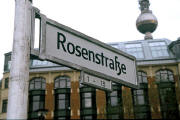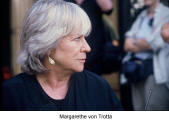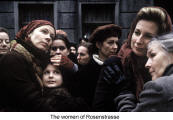
Rosenstrasse, a German Film
by Sybille Forster-Rentmeister
(photos: supplied by Rosenstrasse ©Jan Betke)
 During
the press showing of Rosenstrasse, Margarethe von Trotta’s latest epic, you
could have heard a feather float to the ground in the audience. That is how
quiet it was. The usual shuffling of feet and coughing and so on was totally
absent. Afterwards people just quietly filed out instead of talking to
colleagues, inquiring how they liked the film.
During
the press showing of Rosenstrasse, Margarethe von Trotta’s latest epic, you
could have heard a feather float to the ground in the audience. That is how
quiet it was. The usual shuffling of feet and coughing and so on was totally
absent. Afterwards people just quietly filed out instead of talking to
colleagues, inquiring how they liked the film.
Everyone was trying to get his or her bearings, digest what just had been presented.
Yes, this was yet another Third Reich movie, the likes most of us do not want to see or hear about anymore. I could already hear so many people say: Don’t they know anything else over there? Have they nothing else to talk about? Does Germany have no other profound stories to tell, other than the misery that was brought to so many millions of people by WWII?
Sure they do. But let’s face it, there is beauty on the battlefield and there are lessons to be learned, viewpoints to be corrected, and truths to be found. And as long as there are question marks on that infamous part of history there will be attempts to answer them.
 Luckily
sometimes a great artist like Margarethe von Trotta weaves the story into a
tapestry of symbolism, while she strays not far from the truth. She takes as
little poetic license as possible and only as is necessary, but keeps the
integrity of the truth. Amalgamating several characteristics into one
personality falls into that creative story weaving and she does it very
well. Each one of the women portrayed in the film is a composite of traits
in various possible women that found themselves in this situation: A
Nuremberg Law stated that Jewish men married to Arian woman, and also in the
event of Jewish women with Aryian men, could not be deported, whatever that
meant.
Luckily
sometimes a great artist like Margarethe von Trotta weaves the story into a
tapestry of symbolism, while she strays not far from the truth. She takes as
little poetic license as possible and only as is necessary, but keeps the
integrity of the truth. Amalgamating several characteristics into one
personality falls into that creative story weaving and she does it very
well. Each one of the women portrayed in the film is a composite of traits
in various possible women that found themselves in this situation: A
Nuremberg Law stated that Jewish men married to Arian woman, and also in the
event of Jewish women with Aryian men, could not be deported, whatever that
meant.
The Film Rosenstrasse embraces this difficult story with much courage. The up to 2 thousand (mainly) women stood for days on end, regardless of cold and wet weather, and intimidation attempts, including soldiers with heavy machine guns, and fast driving tactical vehicles, in front of the building on Rosenstrasse, where their loved ones were brutally being held captive. Out of the many individuals we get to know a few of them closer. Telescopically the film concentrates on the essentials of characters and their stories as representative for the rest of the many in the background.
The German Magazine Der Spiegel gripes a lot about this movie. The entire tone of the review is covertly hostile to the movie and its maker. It claims that the film lacks realism, does not demonstrate triumph after the women won out over the authorities. The reviewer does not understand that relief was the more accurate emotion that must have been prevalent in this situation. The resident reviewer drips with sarcasm and demonstrates clearly that he does not understand much about human nature, especially when it finds itself under duress.
This Spiegel review illustrates that and why movies like this are still necessary, especially in this world of fully fed, overeducated intellectuals and underfed, undereducated red neck bullies and barbarians, neither of which are capable of experiencing anything more than that which hits them over the head hard and painful. Subtlety is not in the realm of their possible experiences.
And Margarethe von Trotta’s film is above all subtle. There are few huge dramatic gestures to be seen, which is representative of a society already living in fear of its dictators. When attention is wanted the colours become bright in an otherwise more monochrome grey shaded picture show. Houses are grey, the weather is grey, the clothes are colourless, and the hungry people and second-class citizens are bloodlessly pale. Perseverance is grey in the light of hopelessness, and it is bright only in the light of dominance and decadence. The symbolism of this colour scheme is almost diabolical satire.
Occasional cleverness born out of a natural survival instinct moves the story forward as much as the unknown acts of kindness and even courage so many Germans demonstrated under difficult circumstances and apparent fear. In a pivotal scene we walk in on a party, which is attended by all the right people, including Mr. Goebbels. A song from the UFA Movie "Stuerme der Leidenschaft" is directly juxtaposed with the desire of the woman on Rosentrasse, who want their men back, as they keep chanting in the cold. "Ich weiss nicht zu wem ich gehoere" (…ich glaube ich gehoere nur mir ganz allein") is the title of this song sung in the salon of a favourite songstress, to soften the man that can make things happen, including sending the captives home. This song is another example of von Trotta’s ability to choose just the right symbolism for any given situation.
And we wonder almost until the end until we find out that Propaganda Minister Goebbels lets all those detainees go. It is clearly not because he has a good heart, or because someone courageous tried to intervene, but because it was not exactly good PR to keep them locked up, as we would say nowadays.
The story was much researched and is based on the truth. The Rosenstrasse women did exist and they did do what the movie claims.
Who would not want to know about this important yet unknown bit of truth? This is unusual film fare indeed, one that works in praise of good people, to use a cliché. There were no real heroes or martyrs. There were just people trying to survive the best way they knew how in an insane world. Some of them were stubborn, some resigned, some had guts and were decent, and some were drawn to the light like moths and burned. Some had not enough courage for life and quietly left forever. We can never hear enough about any of them!
This story, 10 years in the making, was in good hands with Margarethe von Trotta. No wonder there was already Oscar talk for "Best Foreign Film".
There are a great variety of German made films in this year’s festival. Check out the action. The website www.bell.ca/filmfest will provide you with all the information you need on "how to film fest" and the when and where of movies.

